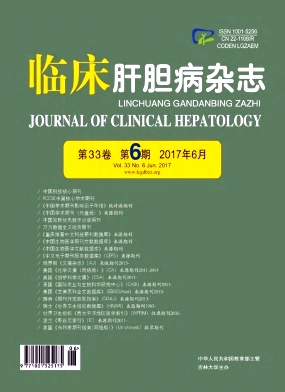|
[1]JEMAL A, BRAY F, CENTER MM, et al.Global cancer statistics[J].CA Cancer J Clin, 2011, 61 (2) :69-90.
|
|
[2]BOLONDI L, BURROUGHS A, DUFOUR JF, et al.Heterogeneity of patients with intermediate (BCLC B) hepatocellular carcinoma:proposal for a subclassification to facilitate treatment decisions[J].Semin Liver Dis, 2012, 32 (4) :348-359.
|
|
[3]BRUIX J, SHERMAN M.Management of hepatocellular carcinoma:an update[J].Hepatology, 2011, 53 (3) :1020-1022.
|
|
[4]European Association for the Study of the Liver;European Organisation for Research and Treatment of Cancer.EASL-EORTC clinical practice guidelines:management of hepatocellular carcinoma[J].J Hepatol, 2012, 56 (4) :908-943.
|
|
[5]HEIMBACH J, KULIK LM, FINN R, et al.AASLD guidelines for the treatment of hepatocellular carcinoma[J].Hepatology, 2017.[Epub ahead of print]
|
|
[6]PARK JW, CHEN M, COLOMBO M, et al.Global patterns of hepatocellular carcinoma management from diagnosis to death:the BRIDGE Study[J].Liver Int, 2015, 35 (9) :2155-2166.
|
|
[7]TREVISANI F, D'INTINO PE, MORSELLI-LABATE AM, et al.Serum alpha-fetoprotein for diagnosis of hepatocellular carcinoma in patients with chronic liver disease:influence of HBs Ag and anti-HCV status[J].J Hepatol, 2001, 34 (4) :570-575.
|
|
[8]MARRERO JA, FENG Z, WANG Y, et al.Alpha-fetoprotein, des-gamma carboxyprothrombin, and lectin-bound alpha-fetoprotein in early hepatocellular carcinoma[J].Gastroenterology, 2009, 137 (1) :110-118.
|
|
[9]NOMURA F, OHNISHI K, TANABE Y.Clinical features and prognosis of hepatocellular carcinoma with reference to serum alpha-fetoprotein levels.Analysis of 606 patients[J].Cancer, 1989, 64 (8) :1700-1707.
|
|
[10]IZUMI R, SHIMIZU K, KIRIYAMA M, et al.Alpha-fetoprotein production by hepatocellular carcinoma is prognostic of poor patient survival[J].J Surg Oncol, 1992, 49 (3) :151-155.
|
|
[11]PENG SY, CHEN WJ, LAI PL, et al.High alpha-fetoprotein level correlates with high stage, early recurrence and poor prognosis of hepatocellular carcinoma:significance of hepatitis virus infection, age, p53 and beta-catenin mutations[J].Int J Cancer, 2004, 112 (1) :44-50.
|
|
[12]LEE YK, KIM SU, KIM DY, et al.Prognostic value of alpha-fetoprotein and des-gamma-carboxy prothrombin responses in patients with hepatocellular carcinoma treated with transarterial chemoembolization[J].BMC Cancer, 2013, 13:5.
|
|
[13]MEMON K, KULIK L, LEWANDOWSKI RJ, et al.Alpha-fetoprotein response correlates with EASL response and survival in solitary hepatocellular carcinoma treated with transarterial therapies:a subgroup analysis[J].J Hepatol, 2012, 56 (5) :1112-1120.
|
|
[14]RIAZ A, RYU RK, KULIK LM, et al.Alpha-fetoprotein response after locoregional therapy for hepatocellular carcinoma:oncologic marker of radiologic response, progression, and survival[J].J Clin Oncol, 2009, 27 (34) :5734-5742.
|
|
[15]PARK WH, SHIM JH, HAN SB, et al.Clinical utility of desgamma-carboxyprothrombin kinetics as a complement to radiologic response in patients with hepatocellular carcinoma undergoing transarterial chemoembolization[J].J Vasc Interv Radiol, 2012, 23 (7) :927-936.
|
|
[16]PERSONENI N, BOZZARELLI S, PRESSIANI T, et al.Usefulness of alpha-fetoprotein response in patients treated with sorafenib for advanced hepatocellular carcinoma[J].J Hepatol, 2012, 57 (1) :101-107.
|
|
[17]LO CM, NGAN H, TSO WK, et al.Randomized controlled trial of transarterial lipiodol chemoembolization for unresectable hepatocellular carcinoma[J].Hepatology, 2002, 35 (5) :1164-1171.
|
|
[18]LLOVET JM, REAL MI, MONTANA X, et al.Arterial embolisation or chemoembolisation versus symptomatic treatment in patients with unresectable hepatocellular carcinoma:a randomised controlled trial[J].Lancet, 2002, 359 (9319) :1734-1739.
|
|
[19]FORNER A, GILABERT M, BRUIX J, et al.Treatment of intermediate-stage hepatocellular carcinoma[J].Nat Rev Clin Oncol, 2014, 11 (9) :525-535.
|
|
[20]RAOUL JL, SANGRO B, FORNER A, et al.Evolving strategies for the management of intermediate-stage hepatocellular carcinoma:available evidence and expert opinion on the use of transarterial chemoembolization[J].Cancer Treat Rev, 2011, 37 (3) :212-220.
|
|
[21]BRUIX J, REIG M, RIMOLA J, et al.Clinical decision making and research in hepatocellular carcinoma:pivotal role of imaging techniques[J].Hepatology, 2011, 54 (6) :2238-2244.
|
|
[22]BRUIX J, REIG M, SHERMAN M.Evidence-based diagnosis, staging, and treatment of patients with hepatocellular carcinoma[J].Gastroenterology, 2016, 150 (4) :835-853.
|
|
[23]JIA J, QI XS, HAN GH.Prognostic value ofα-fetoprotein response in treatment of hepatocellular carcinoma[J].J Clin Hepatol, 2013, 28 (8) :576-580. (in Chinese) 贾佳, 祁兴顺, 韩国宏.甲胎蛋白应答在肝细胞癌治疗中的预后价值[J].临床肝胆病杂志, 2013, 28 (8) :576-580.
|
|
[24]LIU L, ZHAO Y, JIA J, et al.The prognostic value of alpha-fetoprotein response for advanced-stage hepatocellular carcinoma treated with sorafenib combined with transarterial chemoembolization[J].Sci Rep, 2016, 6:19851.
|







 DownLoad:
DownLoad: